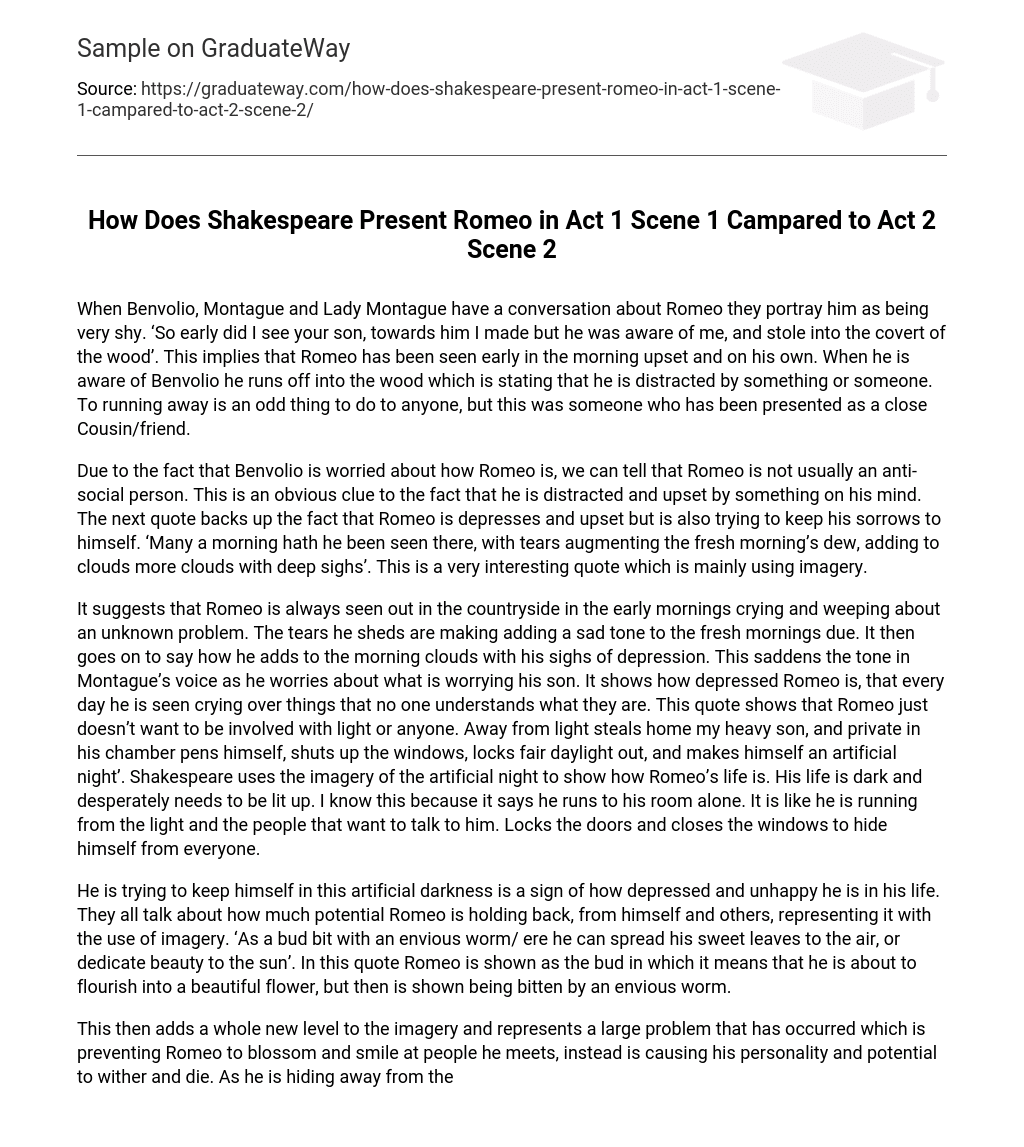In a conversation about Romeo, Benvolio, Montague, and Lady Montague describe him as extremely timid. They mention, “So early did I see your son, towards him I made but he was aware of me, and stole into the covert of the wood.” This suggests that Romeo has been observed feeling upset and alone early in the morning. When he notices Benvolio, he quickly flees into the woods, indicating that he is distracted by something or someone. Running away from someone close like a cousin/friend is an unusual behavior.
From Benvolio’s concern for Romeo, it is evident that Romeo is typically a sociable person. However, his current state of distraction and sadness suggest that something is weighing heavily on his mind. The following quote further supports the notion that Romeo is depressed and attempting to hide his sorrows: “Many a morning hath he been seen there, with tears augmenting the fresh morning’s dew, adding to clouds more clouds with deep sighs.” This quote utilizes vivid imagery to convey Romeo’s emotional state.
The passage suggests that Romeo is frequently seen in the countryside early in the mornings, shedding tears and expressing sadness over an unknown problem. His weeping contributes to a melancholic atmosphere in the fresh mornings. Additionally, his sighs of depression add to the clouds that cover the morning sky, further deepening the concerns of Montague as he worries about his son’s emotional state. This indicates that Romeo is so profoundly depressed that he is constantly seen crying about undisclosed matters. The quote demonstrates Romeo’s avoidance of light and contact with others: “Away from light steals home my heavy son, and private in his chamber pens himself, shuts up the windows, locks fair daylight out, and makes himself an artificial night.” By using the imagery of an artificial night, Shakespeare portrays Romeo’s dark and desperate existence, which requires illumination. This is evident from his solitary retreat to his room, as if he is escaping from both light and people by locking doors and closing windows.
The fact that he is attempting to remain in this fabricated darkness reflects the extent of his depression and unhappiness in his life. They discuss Romeo’s untapped potential, both for himself and others, using imagery to illustrate it. “Like a bud infected by a jealous worm, before he can unfold his sweet leaves to the air or offer his beauty to the sun.” This quote portrays Romeo as the bud, symbolizing his impending blossoming into a magnificent flower, but then being harmed by a jealous worm.
This text highlights the impact of Romeo’s current situation on his well-being and engagement with others. It signifies a significant obstacle that prevents Romeo from fully flourishing and embracing social interactions, causing his personality and potential to deteriorate. By avoiding sunlight and people, Romeo is unable to showcase his true appearance and character to those around him, leading others to perceive him as highly reclusive. In Act 2 Scene 2, the text showcases Romeo’s sudden and profound love for Juliet through his immediate reaction upon seeing her room. He describes Juliet as the light of his life, someone who brings him immense joy whenever he lays eyes on her. The mention of her room as the “east” symbolizes his desire for her presence to illuminate his life like a sunrise. This behavior vastly contrasts with his actions in Act 1 Scene 1 when he sought isolation and darkness. Instead, Romeo now craves brightness and happiness with Juliet as his source of light, uplifting every aspect of his existence.
By referring to her as his sun, he is expressing that she brings warmth, happiness, and light to his life. Comparing Juliet to an angel, he presents a religious perspective. “Bright angel, for thou art as glorious to this night, being o’er my head, as is a winged messenger of heaven.” This comparison portrays Juliet as a divine messenger who stands above him on her balcony. He adores her, as she brings light, warmth, and happiness to his life. This also suggests that he sees her as too beautiful to be human and considers her to be an angel sent from God.
He treats her as if she is as stunning as a divine being sent exclusively for him. Referring to someone as an angel is a significant compliment because angels are believed to be flawless. This quote truly demonstrates the extent to which he is willing to go for love. “With love’s light wings did I o’erperch these walls, for stony limits cannot hold love out”. It is an excellent illustration of how much Romeo’s character has transformed since Act 1, Scene 1. As a result of his sudden love for Juliet, he has endangered his entire life for her and is describing how he scaled tall walls just to catch a glimpse of Juliet.
This passage demonstrates the depth of Romeo’s love and his willingness to do anything for Juliet. It highlights the profound transformation in his personality from Act 1 Scene 1, where he appeared indifferent. By risking his life, he declares his unwavering devotion to her. Romeo expresses the sentiment, “I would rather die by their hatred than live without your love,” emphasizing the magnitude of his declaration.
This statement is significant because it illustrates his immense love for her and emphasizes that being separated from her would be unbearable. It signifies a remarkable transformation since the beginning of the play, where he sought refuge in darkness and only desired the feeling of being in love. Now, he is genuinely in love and enthusiastically willing to do anything for his beloved. Rather than shying away from light, he wishes for it, with Juliet becoming the main source of illumination in his life.





